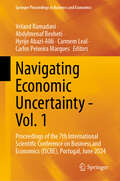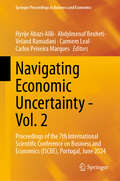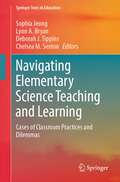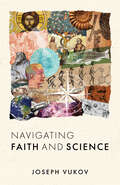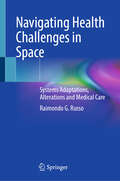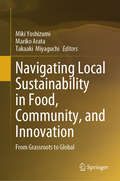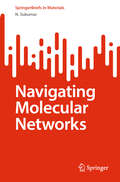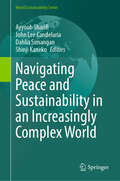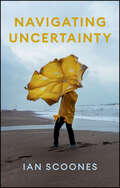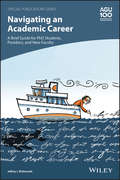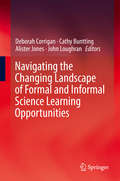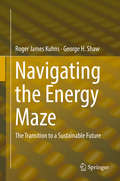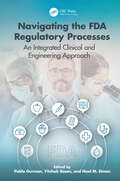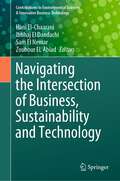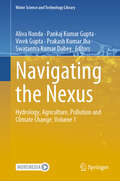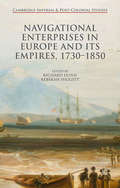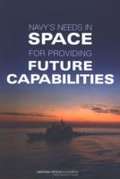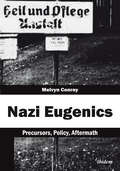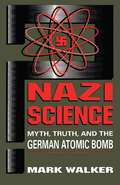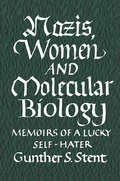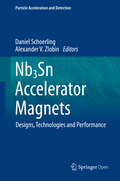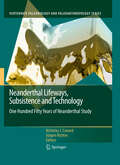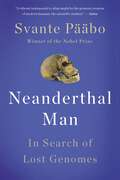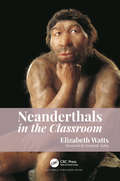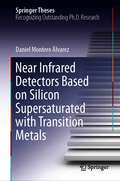- Table View
- List View
Navigating Economic Uncertainty - Vol. 1: Proceedings of the 7th International Scientific Conference on Business and Economics (ISCBE), Portugal, June 2024 (Springer Proceedings in Business and Economics)
by Veland Ramadani Abdylmenaf Bexheti Hyrije Abazi-Alili Carmem Leal Carlos Peixeira MarquesThis book is the first volume presenting carefully selected chapters from the proceedings of the 7th International Scientific Conference on Business and Economics (ISCBE), Vila Real, Portugal, which took place in June 2024. The chapters provide key strategies for thriving in the midst of economic turbulence and explore adaptation, innovation, and resilience in our modern, unpredictable landscape. They cover a wide range of areas relevant to contemporary business and economics issues such as economic shocks, high inflation, energy crisis, growth prospects, economic forecast, labor market, gender inequalities, migration, entrepreneurship, firm development and innovations, and technological transformation. The book is an essential compass for business leaders to navigate market volatility and economic uncertainty.
Navigating Economic Uncertainty - Vol. 2: Proceedings of the 7th International Scientific Conference on Business and Economics (ISCBE), Portugal, June 2024 (Springer Proceedings in Business and Economics)
by Veland Ramadani Abdylmenaf Bexheti Hyrije Abazi-Alili Carmem Leal Carlos Peixeira MarquesThis book is the second volume presenting carefully selected chapters from the proceedings of the 7th International Scientific Conference on Business and Economics (ISCBE),Vila Real, Portugal, which took place in June 2024. The chapters provide key strategies for thriving in the midst of economic turbulence and explore adaptation, innovation and resilience in our modern, unpredictable landscape. They cover a wide range of areas relevant to contemporary business and economics issues such as economic shocks, high inflation, energy crisis, growth prospects, economic forecast, labor market, gender inequalities, migration, entrepreneurship, firm development and innovations, and technological transformation. The book is an essential compass for business leaders to navigate market volatility and economic uncertainty.
Navigating Elementary Science Teaching and Learning: Cases of Classroom Practices and Dilemmas (Springer Texts in Education)
by Deborah J. Tippins Sophia Jeong Lynn A. Bryan Chelsea M. SextonThis book is a resource for both prospective and practicing elementary teachers as they learn to teach science in ways which foster the development of a community of science learners with multiple perspectives and diverse approaches to problem solving. It includes cases that feature dilemmas embedded in rich narrative stories which characterize the lives of teachers of science, and by extension their students, and serve as tools for discussion, critique, and reflective practice. The introduction to the book explores changing contexts for elementary science teaching and learning, and describes how case-based pedagogy can be used as a tool for both instruction and research. Each subsequent section of the book includes cases that are organized around topics such as contemporary approaches to teaching elementary science, new roles for technology, and the creation of inclusive learning environments for all students in elementary science. Each case is followed by reflective commentaries and concludes with questions for reflection and discussion. Teachers will benefit from these cases as they explore the complexities and ambiguities of elementary science teaching and learning in today’s classrooms.
Navigating Faith and Science
by Joseph VukovReligious belief is often perceived as being in conflict with science—but does it have to be? Not usually, says Joseph Vukov. In this short, accessible guide, Vukov advances three models for Christians to utilize when navigating the relationship between science and faith: conflict, independence, and dialogue. He argues that dialogue is the ideal model to follow most of the time—but not necessarily all the time. Through a philosophical approach grounded in compelling real-world examples, Vukov shows how no single model can be universally adequate, and how Christians must proceed with discernment according to the nature of the matter at hand. Considering a wide variety of illustrative issues—including cosmology, evolutionary biology, extraterrestrial life, miracles, brain death, and theoretical physics—Vukov introduces and describes each of the three models of interaction between faith and science, surveys their applications, and evaluates the effectiveness of each. Throughout, he encourages Christians to embrace a spirit of intellectual humility and remember that, at their best, faith and science converge in their relentless human pursuit of truth.
Navigating Health Challenges in Space: Systems Adaptations, Alterations and Medical Care
by Raimondo G. RussoThe book investigates the changes that the space environment causes on the human body and the challenges of living and working in space. It explores aspects such as weightlessness, radiation, and solar radiation, the impact on immune system, as well as the difficulties in meeting physiological needs, maintaining personal hygiene, and nourishment. The complex interactions of living conditions in space and how telecommunication technology can provide remote medical care are also analyzed. Furthermore, it examines the effects of space on various organs, exploring human limits and adaptations, and investigates the alterations in human physiology due to space conditions. This book is a tribute to the dedicated individuals who have tirelessly pursued the frontiers of space research. It delves into the enigmatic realms of astrophysics and astrochemistry, shedding light on subjects that remain largely unexplored. It also aims to stimulate a greater understanding of space research, an activity often surrounded by mysteries and fantasies.
Navigating Local Sustainability in Food, Community, and Innovation: From Grassroots to Global
by Miki Yoshizumi Mariko Arata Takaaki MiyaguchiThis book offers an in-depth exploration of the transformative potential of sustainable local food systems, spotlighting grassroots initiatives that have global implications. It provides a comprehensive guide to navigating the complexities of community-based sustainability through case studies, theoretical discussions, and practical insights.The main topics covered in this book include community initiatives in sustainable resource utilization, ecotourism as a catalyst for sustainable food systems, and the myriad issues and challenges in implementing these systems effectively. These topics span various geographical locations, from the eco-tourism projects in Bad Hindelang, Germany, to community initiatives in Hong Ha commune, Vietnam. Each chapter is meticulously researched and written by experts in the field, offering a blend of academic rigor and real-world applicability.These topics are both timely and highly relevant in the current global context, where sustainability has become a focal point of discussions, both academically and publicly. The challenges surrounding food security, environmental degradation, and social equity make pursuing sustainable local food systems an urgent imperative. By providing a 360-degree view of the opportunities and obstacles in this field, the book aims to equip readers with the knowledge and tools to contribute to a more sustainable future.The problem we set out to solve is multi-dimensional. On one hand, there's a need for practical solutions that can be implemented at the community level. On the other hand, there's an equally pressing need for a theoretical framework that can guide these implementations and scale them in an effective and sustainable way. This book aims to bridge that gap by offering evidence-based strategies at the grassroots level and the theoretical underpinnings supporting them.The book is not just an academic exercise but a call to action. It invites readers to engage critically with the material, question existing paradigms, and consider how these sustainable models could be implemented in their communities. Practical examples and case studies make the material accessible, while the rigorous academic framework ensures that the book holds value in scholarly discussions.This volume is ideal for students, researchers, policymakers, and practitioners in sustainability studies, environmental science, and food systems. It will also appeal to anyone interested in understanding how local actions can contribute to global solutions in pursuing sustainable food systems.
Navigating Molecular Networks (SpringerBriefs in Materials)
by N. SukumarThis book delves into the foundational principles governing the treatment of molecular networks and "chemical space"—the comprehensive domain encompassing all physically achievable molecules—from the perspectives of vector space, graph theory, and data science. It explores similarity kernels, network measures, spectral graph theory, and random matrix theory, weaving intriguing connections between these diverse subjects. Notably, it emphasizes the visualization of molecular networks. The exploration continues by delving into contemporary generative deep learning models, increasingly pivotal in the pursuit of new materials possessing specific properties, showcasing some of the most compelling advancements in this field. Concluding with a discussion on the meanings of discovery, creativity, and the role of artificial intelligence (AI) therein.Its primary audience comprises senior undergraduate and graduate students specializing in physics, chemistry, and materials science. Additionally, it caters to those interested in the potential transformation of material discovery through computational, network, AI, and machine learning (ML) methodologies.
Navigating Peace and Sustainability in an Increasingly Complex World (World Sustainability Series)
by Shinji Kaneko Ayyoob Sharifi Dahlia Simangan John Lee CandelariaThis book, a sequel to a well-received book titled “Bridging Peace and Sustainability Amidst Global Transformations,” delves deeper into the entwined roots of peace and sustainability and emphasizes their interdependence. How are peace and sustainability interconnected, and what key factors define the relationship between them? These questions were examined at the NERPS 2024 conference in Hiroshima and are central to our narrative. In this book, we explore the synergy of peace and sustainability through theoretical frameworks and real-world examples.We recognize that while the 2030 Agenda for Sustainable Development has acknowledged the link between peace and sustainability, a significant gap remains. Too often, efforts to promote peace and sustainability run parallel, never intertwining, losing the chance to bolster each other. We argue for merging the peace and sustainability agendas to confront contemporary challenges, calling for action to enhance and take advantage of their mutual reinforcement. Through diverse perspectives, this collection illuminates the social, economic, and environmental dimensions of this nexus, serving as a guide for policymakers, a reference for researchers, and a catalyst for dialogue among sectors committed to achieving the Sustainable Development Goals.
Navigating Uncertainty: Radical Rethinking for a Turbulent World
by Ian ScoonesUncertainties are everywhere. Whether it’s climate change, financial volatility, pandemic outbreaks or new technologies, we don’t know what the future will hold. For many contemporary challenges, navigating uncertainty – where we cannot predict what may happen – is essential and, as the book explores, this is much more than just managing risk. But how is this done, and what can we learn from different contexts about responding to and living with uncertainty? Indeed, what might it mean to live from uncertainty?Drawing on experiences from across the world, the chapters in this book explore finance and banking, technology regulation, critical infrastructures, pandemics, natural disasters and climate change. Each chapter contrasts an approach centred on risk and control, where we assume we know about and can manage the future, with one that is more flexible, responding to uncertainty. The book argues that we need to adjust our modernist, controlling view and to develop new approaches, including some reclaimed and adapted from previous times or different cultures. This requires a radical rethinking of policies, institutions and practices for successfully navigating uncertainties in an increasingly turbulent world.
Navigating an Academic Career: A Brief Guide For Phd Students, Postdocs, And New Faculty (Special Publications #74)
by Jeffrey J. McDonnellDemystifies the academic career path with practical advice With the number of people being awarded PhDs growing far more rapidly than the supply of academic jobs, those at an early-career stage must think strategically in order to be competitive and successful. Navigating an Academic Career: A Brief Guide for PhD students, Post docs, and New Faculty is a concise and conversational manual that guides readers through starting their academic journey, surviving the demands of their first academic position, and thriving in academia and beyond. Volume highlights include: Firsthand perspective on the characteristics of a successful academic Guidance on interviewing, negotiating, branding, and other essential soft skills Tips for effective time management and writing high-impact research papers Insights into developing leadership skills and mentoring others The American Geophysical Union promotes discovery in Earth and space science for the benefit of humanity. Its publications disseminate scientific knowledge and provide resources for researchers, students, and professionals.
Navigating the Changing Landscape of Formal and Informal Science Learning Opportunities
by John Loughran Alister Jones Cathy Buntting Deborah CorriganThis book presents research involving learning opportunities that are afforded to learners of science when the focus is on linking the formal and informal science education sectors. It uses the metaphor of a "landscape" as it emphasises how the authors see the possible movement within a landscape that is inclusive of formal, informal and free-choice opportunities. The book explores opportunities to change formal school science education via perspectives and achievements from the informal and free-choice science education sector within the wider lifelong, life-wide education landscape. Additionally it explores how science learning that occurs in a more inclusive landscape can demonstrate the potential power of these opportunities to address issues of relevance and engagement that currently plague the learning of science in school settings. Combining specific contexts, case studies and more general examples, the book examines the science learning landscapes by means of the lens of an ecosystem and the case of the Synergies longitudinal research project. It explores the relationships between school and museum, and relates the lessons learned through encounters with a narwhal. It discusses science communication, school-community partnerships, socioscientific issues, outreach education, digital platforms and the notion of a learning ecology.
Navigating the Energy Maze
by George H. Shaw Roger James KuhnsThis book presents essential information for the development of a comprehensive sustainable energy policy. It examines the diverse types of energy, their resource abundance and the material needs to develop and use them, and how communities and cities can better control their own destinies by locally managing energy use and generation. This approach does not suggest the undoing of existing infrastructures and energy providers, but rather a cooperative transition from national-regional energy management to a more local-centered system. The information is the foundation for eight specific legislative initiatives necessary for a national comprehensive sustainable policy that can both facilitate and drive the process of evolution from a carbon-energy economy to a sustainable renewable energy future.
Navigating the FDA Regulatory Processes: An Integrated Clinical and Engineering Approach
by Pablo Gurman, Yitzhak Rosen, and Noel M. ElmanThis book provides a unique knowledge source of the FDA’s regulatory processes to anyone interested in the development and approval of biomedical products.Navigating the FDA Regulatory Processes will be of particular importance for those innovating in biomedical devices, pharmacological therapies, and combination products, who are interested in considering regulatory affairs early on in product development. The authors offer a comprehensive exploration of FDA regulations, providing industry insights and guidance for navigating the complexities of drug and device development. The book offers concrete examples, industry perspectives, and historical context, ensuring clarity and aiding in successful understanding of the requirements for regulatory compliance. Readers will also gain a thorough understanding of FDA regulatory processes, from securing approvals to navigating expedited pathways. Lastly, the book provides unique insights into the FDA approach for emergency preparedness, including discussing the recent COVID-19 pandemic.Biomedical industry personnel, engineers, scientists, entrepreneurs, medical doctors, students, and anyone interested in the development and approval of medical products in the US will find this book useful and essential.
Navigating the Intersection of Business, Sustainability and Technology (Contributions to Environmental Sciences & Innovative Business Technology)
by Hani El-Chaarani Ibtihaj El Dandachi Sam El Nemar Zouhour El AbiadIn today's world, businesses are increasingly recognizing the importance of sustainability and technology as essential components of their operations. This book offers a comprehensive guide to help you navigate the complexities of the interconnected areas of business, sustainability and technology. The book further shows how sustainability and technology are transforming the business landscape and how they can harness their power to drive innovation, create value and achieve long-term success. Drawing on the latest research and real-world case studies, the book provides practical insights and strategies that readers can use to navigate this rapidly changing landscape. The book further offers a comprehensive roadmap to navigate the intersection of business, sustainability and technology, including developing sustainable business models and cutting-edge technologies such as artificial intelligence and blockchain. This book is an essential resource for business leaders, entrepreneurs, investors and students.
Navigating the Nexus: Hydrology, Agriculture, Pollution and Climate Change, Volume 1 (Water Science and Technology Library #102)
by Pankaj Kumar Gupta Swatantra Kumar Dubey Prakash Kumar Jha Aliva Nanda Vivek GuptaThis book encompasses updated information as well as future directions for researchers working in the fields of environmental science, water resource engineering, and agricultural science. Navigating the Nexus: Hydrology, Agriculture, Pollution, and Climate Change focuses on the thematic areas of water resource, agriculture, and environmental domains. This book covers advances in modelling approaches, including Machine Learning (ML)/Artificial Intelligence (AI) applications; GIS and remote sensing; and sensors; to provide hydrological, agricultural, and environmental solutions during the ongoing climate crisis.
Navigational Enterprises in Europe and its Empires, 1730–1850 (Cambridge Imperial and Post-Colonial Studies Series)
by Richard Dunn Rebekah HiggittThis book explores the development of navigation in the eighteenth and nineteenth centuries. It examines the role of men of science, seamen and practitioners across Europe, and the realities of navigational practice, showing that old and new methods were complementary not exclusive, their use dependent on many competing factors.
Navy's Needs In Space For Providing Future Capabilities
by National Research Council of the National AcademiesThe United States must operate successfully in space to help assure its security and economic well being. The Department of the Navy is a major user of space capabilities, although those capabilities are now primarily provided by DOD, the Air Force, and NOAA. Following a DOD assessment of national space security management in 2001, the Navy commissioned a Panel to Review Space to assess Navy space policy and strategy. As an extension of that review, the NRC was requested by the Navy to examine its needs in space for providing future operational and technical capabilities. This report presents a discussion of the strategic framework of future space needs, the roles and responsibilities for meeting those needs, an assessment of Navy support to space mission areas, and a proposed vision for fulfilling Naval forces space needs.
Nazi Eugenics: Precursors, Policy, Aftermath
by Melvyn ConroyConceived as the answer to all of mankind's seemingly insoluble health and social problems, and promoted as a substitute for orthodox religious beliefs, the pseudoscience of eugenics recruited disciples in many countries during the latter years of the nineteenth and early years of the twentieth centuries. Nowhere was this doctrine more enthusiastically endorsed than in Germany, where the application of eugenic theory received its most fervent support. A program born of what were often contradictory opinions began, under Nazi rule, with the compulsory sterilization of thousands of Germany's citizens before morphing into the mass murder of the most vulnerable of the state's own population under the guise of so-called "euthanasia," before ultimately escalating into a continent-wide policy of extermination of those who did not fit the Nazi eugenic template.The progress of this inexorable descent into barbarity was marked by successive stages of development. From the practical application of euthanasia through the organization dedicated to it—later on called Aktion T4—and the killing centers that this institution spawned, to the centrality of Aktion T4 to Aktion Reinhardt and the Holocaust, important elements of the historical record can be seen to emerge. How did it happen? What impact has it had on contemporary society? And what of the character and fate of the individuals involved in the gestation and implementation of this murderously inhumane quasi-religion? These deceptively simple questions require complex and often disturbing answers, as shown by Melvyn Conroy in this important work.
Nazi Science: Myth, Truth, And The German Atomic Bomb
by Mark WalkerIn this book, Mark Walker - a historical scholar of Nazi science - brings to light the overwhelming impact of Hitler's regime on science and, ultimately, on the pursuit of the German atomic bomb. Walker meticulously draws on hundreds of original documents to examine the role of German scientists in the rise and fall of the Third Reich. He investigates whether most German scientists during Hitler's regime enthusiastically embraced the tenets of National Socialism or cooperated in a Faustian pact for financial support, which contributed to National Socialism's running rampant and culminated in the rape of Europe and the genocide of millions of Jews. This work unravels the myths and controversies surrounding Hitler's atomic bomb project. It provides a look at what surprisingly turned out to be an Achilles' heel for Hitler - the misuse of science and scientists in the service of the Third Reich.
Nazis, Women and Molecular Biology
by Gunther StentWhat prompts a well-renowned scientist in molecular biology to write memoirs about a part of his life? In the case of Gunther Stent, it was not to reflect on his career as a scientist, but to come to an understanding of his own soul. In his seventies, he had come to see that he had been, throughout his life, an emotional sleepwalker, especially as regards women and, in addition, that he had been troubled by Jewish self-hatred. His story may have more to do with St. Augustine's Confessions than with a scientist's memoirs. Stent provides insight into the power of political correctness, and the ability of a government to establish a perverse vision of reality. For readers interested in bioethics, Stent's memoirs help to explain how Germany could have been the first country to enact an all-encompassing protection for human research subjects while it was also the country that produced the medical experiments of the Nazis and the greatest perversion of medical morality in history. Stent is a person of intelligence and subtlety, an accomplished writer, a deep and wise man, and a loyal friend. His narrative is centered emotionally on a youth spent in Berlin in the Nazi period. As a boy of fourteen he was an eyewitness of the horrors of the Kristallnacht pogrom.On New Year's Eve 1938 he escaped from Germany across the "green frontier." He came to America in his teens, only to return to Berlin at the end of World War II as a scientific consultant for the U.S. Military. On his return to the States, Stent participated in the exciting early scientific breakthroughs of molecular biology that transformed the twentieth-century life sciences. His Nazis, Women and Molecular Biology is a piercing self-examination, and as its review in Science Newsletter says, "an act of self-exposure, abnegation, contrition, and expiation." It will be of keen interest to those who have inhabited Stent's worlds or shared his experiences, as well as those who wish to learn more about them. Gunther S. Stent is professor emeritus of neurobiology at the University of California, Berkeley. He is the author of such classic texts as Molecular Biology of Bacterial Viruses and Molecular Genetics, as well as philosophical books, such as The Coming of the Golden Age, Paradoxes of Progress, and, most recently (2002), Paradoxes of Free Will.
Nb3Sn Accelerator Magnets: Designs, Technologies and Performance (Particle Acceleration and Detection)
by Daniel Schoerling Alexander V. ZlobinThis open access book is written by world-recognized experts in the fields of applied superconductivity and superconducting accelerator magnet technologies. It provides a contemporary review and assessment of the experience in research and development of high-field accelerator dipole magnets based on Nb3Sn superconductor over the past five decades. The reader attains clear insight into the development and the main properties of Nb3Sn composite superconducting wires and Rutherford cables, and details of accelerator dipole designs, technologies and performance. Special attention is given to innovative features of the developed Nb3Sn magnets. The book concludes with a discussion of accelerator magnet needs for future circular colliders.
Neanderthal Lifeways, Subsistence and Technology
by Nicholas J. Conard Jürgen RichterThe 150th anniversary of the discovery of the famous Neanderthal fossils gave reason for an international and interdisciplinary symposium in Bonn/Germany. The present book arose from this congress and focuses on multiple aspects of archaeological investigation on Neanderthal lifeways. In-depth studies of top-ranking scientists provide a detailed and comprehensive survey of contemporary research on our Pleistocene relatives. Examinations and debates are embedded in a variety of regions and time frames. Chronology, subsistence, land use, and cultural adaptations among late Neanderthals form the major trajectories of the book. The wide range of approaches involved, leads to an increasing understanding of the facets of and the variability of Neanderthal behavioural patterns. The present volume is complemented by a paleontologically orientated publication of the same congress (edited by Gerd-Christian Weniger and Silvana Condemi).
Neanderthal Man: In Search of Lost Genomes
by Svante PaaboA preeminent geneticist hunts the Neanderthal genome to answer the biggest question of them all: what does it mean to be human? What can we learn from the genes of our closest evolutionary relatives? Neanderthal Man tells the story of geneticist Svante Pääbo’s mission to answer that question, beginning with the study of DNA in Egyptian mummies in the early 1980s and culminating in his sequencing of the Neanderthal genome in 2009. From Pääbo, we learn how Neanderthal genes offer a unique window into the lives of our hominin relatives and may hold the key to unlocking the mystery of why humans survived while Neanderthals went extinct. Drawing on genetic and fossil clues, Pääbo explores what is known about the origin of modern humans and their relationship to the Neanderthals and describes the fierce debate surrounding the nature of the two species’ interactions. A riveting story about a visionary researcher and the nature of scientific inquiry, Neanderthal Man offers rich insight into the fundamental question of who we are.
Neanderthals in the Classroom
by Elizabeth Marie WattsNeanderthals in the Classroom examines the ongoing battle surrounding evolution from a cultural and historical perspective and then puts Theodosius Dobzhansky’s claim that “nothing in biology makes sense except in the light of evolution” to the ultimate test by exploring the potential evolutionary roots of this societal and educational clash over human origins. In examining the biological roots of the conflict, Watts demonstrates how understanding our inner Neanderthal allows us to consciously choose more highly evolved forms of communication as a means of alleviating societal division and creating space for more effective science education. Key Features: Introduces readers to the multifaceted world of evolution education. Describes the complex interplay between religious beliefs and science as well as the clash of false information and formal education. Offers an overview of the transformation of public opinion of evolution and science over time in the United States due to the perceived conflict between science and religion. Examines students’ misconceptions about the theory of evolution and the general nature of scientific discovery due to the contradictory messages that they receive in popular culture. Offers potential means to amend misconceptions so that students and other individuals can integrate evolutionary theory into their worldviews, regardless of their religious background.
Near Infrared Detectors Based on Silicon Supersaturated with Transition Metals (Springer Theses)
by Daniel Montero ÁlvarezThis thesis makes a significant contribution to the development of cheaper Si-based Infrared detectors, operating at room temperature. In particular, the work is focused in the integration of the Ti supersaturated Si material into a CMOS Image Sensor route, the technology of choice for imaging nowadays due to its low-cost and high resolution. First, the material is fabricated using ion implantation of Ti atoms at high concentrations. Afterwards, the crystallinity is recovered by means of a pulsed laser process. The material is used to fabricate planar photodiodes, which are later characterized using current-voltage and quantum efficiency measurements. The prototypes showed improved sub-bandgap responsivity up to 0.45 eV at room temperature. The work is further supported by a collaboration with STMicroelectronics, where the supersaturated material was integrated into CMOS-based sensors at industry level. The results show that Ti supersaturated Si is compatible in terms of contamination, process integration and uniformity. The devices showed similar performance to non-implanted devices in the visible region. This fact leaves the door open for further integration of supersaturated materials into CMOS Image Sensors.
